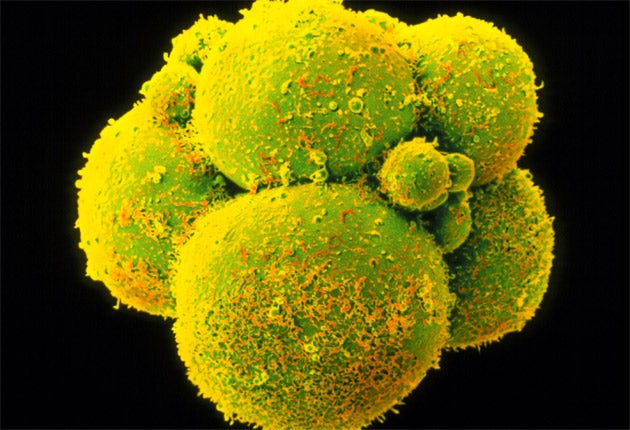Would-be parents to be allowed to store frozen eggs and sperm for up to 55 years
Change in law to remove pressure of ‘ticking clock’ around starting a family

Your support helps us to tell the story
From reproductive rights to climate change to Big Tech, The Independent is on the ground when the story is developing. Whether it's investigating the financials of Elon Musk's pro-Trump PAC or producing our latest documentary, 'The A Word', which shines a light on the American women fighting for reproductive rights, we know how important it is to parse out the facts from the messaging.
At such a critical moment in US history, we need reporters on the ground. Your donation allows us to keep sending journalists to speak to both sides of the story.
The Independent is trusted by Americans across the entire political spectrum. And unlike many other quality news outlets, we choose not to lock Americans out of our reporting and analysis with paywalls. We believe quality journalism should be available to everyone, paid for by those who can afford it.
Your support makes all the difference.Prospective parents are to be given the right to keep frozen eggs, sperm and embryos in storage for as long as 55 years while they decide when is best to start a family.
Health secretary Sajid Javid announced that the government plans to scrap the current rule which requires destruction of unused material after 10 years.
He said the change would remove the pressure of the “ticking clock” on would-be mothers and fathers who have opted to freeze eggs and sperm but may not be ready to make use of them.
Under the new system, prospective parents will be given the option on keeping or disposing at 10-year intervals.
Mr Javid said the reform proposals, which follow a consultation earlier this year, reflect new “vitrification” freezing methods which allow human eggs to be stored indefinitely without deterioration, as well as the increasing success of using frozen embryos in routine IVF treatment.
Additional conditions will be drawn up separately in relation to the use of third-party donors and the posthumous use of material from individuals who have since died.
The health secretary said the new arrangements will not only offer greater reproductive choice and less pressured decision-making for parents, but also ensure greater equality as the same rules will apply to everyone and storage limits will not be dictated by medical need.
“The current storage arrangements can be severely restrictive for those making the important decision about when to start a family, and this new legislation will help turn off the ticking clock in the back of people’s minds,” said Mr Javid.
“There are any number of reasons why someone may choose to preserve their fertility, and it is one of the most personal decisions any of us can make. Technological breakthroughs – including in egg freezing –have changed the equation in recent years and it’s only right that this progress puts more power into the hands of potential parents.
“By making these changes, we are going to take a huge step forwards, not just for giving people greater freedom over their fertility, but for equality too.”
The chair of the Human Fertilisation and Embryology Authority, Julia Chain, welcomed the plans, which she said would “bring the law in line with advances in science, changes in modern society and individuals’ reproductive choices”.
“Any decision to store or preserve eggs, sperm or embryos is a serious one and anyone considering this must be given full information on the procedures involved, including the best time to freeze and likelihood of successfully using them to have a baby in future,” said Ms Chain.
”It is important that the new rules are clear and that fertility clinics are given adequate time to update their procedures to ensure they can both implement the changes effectively and give patients sufficient information so that they are fully informed about their options.”
A baby boy was born in Australia in 2015 using sperm frozen 23 years earlier by his father at the age of 15 before he underwent chemotherapy for Hodgkin’s lymphoma which left him infertile.
Raj Mathur, the chair of the British Fertility Society which has lobbied for modernisation of the law, said the change “ensures that UK regulation is compliant with the scientific evidence about the safety of storage, and protects the ability of all our patients to make reproductive choices for themselves as individuals and couples”.
The government’s minister for innovation Lord Bethell said: “People across the UK are starting families later in life and it is increasingly commonplace for people to choose to freeze their eggs, sperm and embryos to preserve fertility. There are myriad reasons for this, such as not being ready or able to start a family or having a medical condition that can lead to premature infertility.
“Prospective parents should not have to wrestle with time limits on their fertility choices, and this important change to storage timescales will give people more control over their future and eliminate the pressure that comes with knowing a decision has to be made within 10 years.”
Join our commenting forum
Join thought-provoking conversations, follow other Independent readers and see their replies
Comments